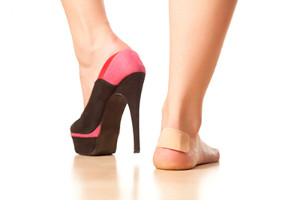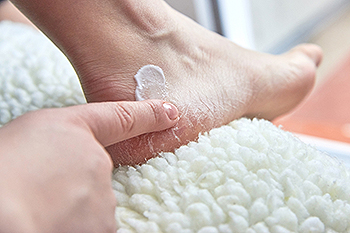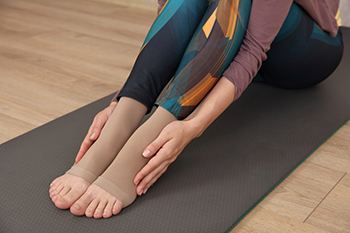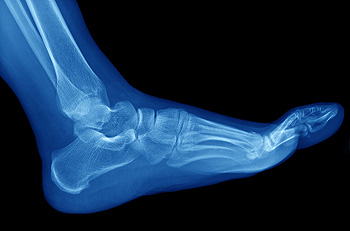Connect With Us
Blog
Items filtered by date: April 2022
Disadvantages of Wearing High Heels

Many women enjoy wearing high heels, despite the pain they may cause. This can be a result of how the foot lies in the shoe, which may gradually cause pain and discomfort. When high heels are frequently worn, muscle balance surrounding the ankle joint may be negatively affected. Additionally, the tendon that connects the muscle to the bone may become strained, and the Achilles tendon can become shorter. Patients who wear high heels for several years often experience pain in their calves when they wear flat shoes. Women who understand the potential problems that can develop from wearing this type of shoe may choose a shoe with a thicker heel. This can provide the balance that is needed to complete daily activities. Performing stretching exercises can help strengthen the feet and toes, as well as help reduce the risk of injury from wearing high heels. If you would like more information about what type of high heels are best for your feet, please ask a podiatrist who can answer any questions you may have.
High heels have a history of causing foot and ankle problems. If you have any concerns about your feet or ankles, contact one of our podiatrists from Crosstown Podiatry. Our doctors can provide the care you need to keep you pain-free and on your feet.
Effects of High Heels on the Feet
High heels are popular shoes among women because of their many styles and societal appeal. Despite this, high heels can still cause many health problems if worn too frequently.
Which Parts of My Body Will Be Affected by High Heels?
- Ankle Joints
- Achilles Tendon – May shorten and stiffen with prolonged wear
- Balls of the Feet
- Knees – Heels cause the knees to bend constantly, creating stress on them
- Back – They decrease the spine’s ability to absorb shock, which may lead to back pain. The vertebrae of the lower back may compress.
What Kinds of Foot Problems Can Develop from Wearing High Heels?
- Corns
- Calluses
- Hammertoe
- Bunions
- Morton’s Neuroma
- Plantar Fasciitis
How Can I Still Wear High Heels and Maintain Foot Health?
If you want to wear high heeled shoes, make sure that you are not wearing them every day, as this will help prevent long term physical problems. Try wearing thicker heels as opposed to stilettos to distribute weight more evenly across the feet. Always make sure you are wearing the proper shoes for the right occasion, such as sneakers for exercising. If you walk to work, try carrying your heels with you and changing into them once you arrive at work. Adding inserts to your heels can help cushion your feet and absorb shock. Full foot inserts or metatarsal pads are available.
If you have any questions please feel free to contact our offices located in Wayne, Montclair, and Randolph, NJ . We offer the newest diagnostic and treatment technologies for all your foot and ankle needs.
All About Your Feet
It’s easy to depend on our feet to stand, walk, run, exercise, play sports, and dance. But even though our feet are such an important part of our lives, they are, quite frankly, often either taken for granted or ignored. The foot is a complex collection of 26 bones, 33 joints, more than 100 ligaments, and a number of muscles. These work to get us where we want to go and do what we want them to do, most of the time without any real conscious thought. As you age, or if you are extremely active, however, caring for your feet becomes more important. Parts wear out, bones get thinner, padding starts to disappear, and injury can follow. Some simple basics can keep your feet healthy: keeping your feet clean, dry and moisturized daily is a good idea. Checking for calluses and corns and having them removed is recommended. Keeping toenails in good trim and straight across, helps prevent ingrown toenails. Proper footwear that offers room for your toes, support for your arches, padding for your heels, and avoiding high heels are other ways to protect your feet. It is suggested that you make regular appointments for a checkup with a podiatrist, especially if you have any foot pain or deformities, to promote good foot health.
Everyday foot care is very important to prevent infection and other foot ailments. If you need your feet checked, contact one of our podiatrists from Crosstown Podiatry. Our doctors can provide the care you need to keep you pain-free and on your feet.
Everyday Foot Care
Often, people take care of their bodies, face and hair more so than they do for their feet. But the feet are a very important aspect of our bodies, and one that we should pay more attention to. Without our feet, we would not be able to perform most daily tasks.
It is best to check your feet regularly to make sure there are no new bruises or cuts that you may not have noticed before. For dry feet, moisturizer can easily be a remedy and can be applied as often as necessary to the affected areas. Wearing shoes that fit well can also help you maintain good foot health, as well as making it easier to walk and do daily activities without the stress or pain of ill-fitting shoes, high heels, or even flip flops. Wearing clean socks with closed shoes is important to ensure that sweat and bacteria do not accumulate within the shoe. Clean socks help to prevent Athlete’s foot, fungi problems, bad odors, and can absorb sweat.
If you have any questions please feel free to contact our offices located in Wayne, Montclair, and Randolph, NJ . We offer the newest diagnostic and treatment technologies for all your foot and ankle needs.
What Can Cause Cracked Heels?
 Severely cracked heels are referred to as heel fissures. They are defined as cracked skin that appears on the heels, and they can often cause pain and discomfort. This condition can occur for several reasons, including being overweight, wearing shoes that have an open back, or standing for the majority of the day. Additionally, medical conditions consisting of psoriasis or eczema may contribute to the development of cracked heels. It is helpful to wash and dry the feet thoroughly, followed by applying a good moisturizer. Cracked heels can be an unsightly, uncomfortable nuisance, and it is strongly suggested that you consult with a podiatrist if this condition is affecting you.
Severely cracked heels are referred to as heel fissures. They are defined as cracked skin that appears on the heels, and they can often cause pain and discomfort. This condition can occur for several reasons, including being overweight, wearing shoes that have an open back, or standing for the majority of the day. Additionally, medical conditions consisting of psoriasis or eczema may contribute to the development of cracked heels. It is helpful to wash and dry the feet thoroughly, followed by applying a good moisturizer. Cracked heels can be an unsightly, uncomfortable nuisance, and it is strongly suggested that you consult with a podiatrist if this condition is affecting you.
Cracked heels are unsightly and can cause further damage to your shoes and feet. If you have any concerns, contact one of our podiatrists from Crosstown Podiatry. Our doctors can provide the care you need to keep you pain-free and on your feet.
Cracked Heels
Cracked heels appear unappealing and can make it harder for you walk around in sandals. Aside from looking unpleasant, cracked heels can also tear stockings, socks, and wear out your shoes. There are several methods to help restore a cracked heel and prevent further damage.
How Do You Get Them?
Dry skin is the number one culprit in creating cracked heels. Many athletes, walkers, joggers, and even swimmers suffer from cracked heels. Age and skin oil production play a role to getting cracked heels as well.
Promote Healing
Over the counter medicines can help, especially for those that need instant relief or who suffer from chronic dry feet.
Wear Socks – Wearing socks with medicated creams helps lock in moisture.
Moisturizers – Applying both day and night will help alleviate dryness which causes cracking.
Pumice Stones – These exfoliate and remove dead skin, which allows for smoother moisturizer application and better absorption into the skin.
Change in Diet
Eating healthy with a well-balanced diet will give the skin a fresh and radiant look. Your body responds to the kinds of food you ingest. Omega-3 fatty acids and zinc supplements can also revitalize skin tissue.
Most importantly, seek professional help if unsure how to proceed in treating cracked heels. A podiatrist will help you with any questions or information needed.
If you have any questions, please feel free to contact our offices located in Wayne, Montclair, and Randolph, NJ . We offer the newest diagnostic and treatment technologies for all your foot care needs.
Do You Suffer From Painful Feet?
Do You Have Poor Blood Circulation in Your Feet?
 Seniors are particularly susceptible to poor blood circulation that can often affect the feet. Symptoms to look for in checking your feet for poor circulation are numbness, tenderness, cramping, swelling, coldness, and discoloration (paleness, white patches on skin and toenails), particularly after physical activity or prolonged standing. It should be considered a critical situation if your feet turn blue as this usually means they are not receiving enough oxygen due to poor circulation. If you have wounds on your feet that are slow to heal, this can also be a sign that blood circulation to your feet is problematic. As one ages, and foot problems become more common, it is a good idea to visit a podiatrist regularly to have your feet examined and tended to. It is particularly important to seek treatment if you suspect poor blood circulation in the feet because, if left untreated, serious problems such as varicose veins and amputation can result.
Seniors are particularly susceptible to poor blood circulation that can often affect the feet. Symptoms to look for in checking your feet for poor circulation are numbness, tenderness, cramping, swelling, coldness, and discoloration (paleness, white patches on skin and toenails), particularly after physical activity or prolonged standing. It should be considered a critical situation if your feet turn blue as this usually means they are not receiving enough oxygen due to poor circulation. If you have wounds on your feet that are slow to heal, this can also be a sign that blood circulation to your feet is problematic. As one ages, and foot problems become more common, it is a good idea to visit a podiatrist regularly to have your feet examined and tended to. It is particularly important to seek treatment if you suspect poor blood circulation in the feet because, if left untreated, serious problems such as varicose veins and amputation can result.
Poor circulation is a serious condition and needs immediate medical attention. If you have any concerns with poor circulation in your feet contact one of our podiatrists of Crosstown Podiatry. Our doctors will treat your foot and ankle needs.
Poor Circulation in the Feet
Poor blood circulation in the feet and legs is can be caused by peripheral artery disease (PAD), which is the result of a buildup of plaque in the arteries.
Plaque buildup or atherosclerosis results from excess calcium and cholesterol in the bloodstream. This can restrict the amount of blood which can flow through the arteries. Poor blood circulation in the feet and legs are sometimes caused by inflammation in the blood vessels, known as vasculitis.
Causes
Lack of oxygen and oxygen from poor blood circulation restricts muscle growth and development. It can also cause:
- Muscle pain, stiffness, or weakness
- Numbness or cramping in the legs
- Skin discoloration
- Slower nail & hair growth
- Erectile dysfunction
Those who have diabetes or smoke are at greatest risk for poor circulation, as are those who are over 50. If you have poor circulation in the feet and legs it may be caused by PAD and is important to make changes to your lifestyle in order to reduce risk of getting a heart attack or stroke. Exercise and maintaining a healthy lifestyle will dramatically improve conditions.
As always, see a podiatrist as he or she will assist in finding a regimen that suits you. A podiatrist can also prescribe you any needed medication.
If you have any questions please feel free to contact our offices located in Wayne, Montclair, and Randolph, NJ . We offer the newest diagnostic and treatment technologies for all your foot and ankle needs.


